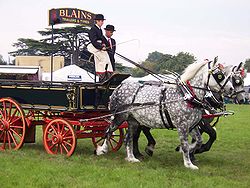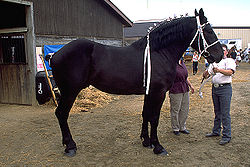(They come in a variety of colors even though grey and black are the most common) |
|||
| Line 16: | Line 16: | ||
The Percheron is characterized by a square forehead, long ears, and a straight profile. Some percherons have long, heavy necks, a broad chest, prominent [[withers]], a short back, heavy muscles in the lower thigh, and a deep girth. A quality example of this breed should have a long croup and a round hip. | The Percheron is characterized by a square forehead, long ears, and a straight profile. Some percherons have long, heavy necks, a broad chest, prominent [[withers]], a short back, heavy muscles in the lower thigh, and a deep girth. A quality example of this breed should have a long croup and a round hip. | ||
| − | However in recent years, Percherons have become more modern, having a longer, thinner neck, a longer back, and longer muscles. These types of modern percherons are used mainly as show horses for competition. The Percheron's mane is generally very thick and the most common colors today are grey or black. | + | However in recent years, Percherons have become more modern, having a longer, thinner neck, a longer back, and longer muscles. These types of modern percherons are used mainly as show horses for competition. The Percheron's mane is generally very thick and the most common colors today are grey or black, which are the only colors recognized by some breed registries. |
==Temperament== | ==Temperament== | ||
Revision as of 15:04, 15 May 2007
The Percheron is a breed of powerful rugged draft horses that originated in the Perche region of France. It gets its name from the Perche valley in the north of France.
History
Like many old breeds, the Percheron's exact origins are unknown, but it is said that its ancestors were crossbred between the heavy "forest horse" type of animal native to northern Europe and the Arabians that were brought to Europe by the Moors. Percherons probably owe their size and weight to their use as battle mounts during the Middle Ages. After the invention of gunpowder, heavy warhorses were no longer needed, so the Percheron took up its new job pulling heavy French stagecoaches. With the invention of the railroad, Percherons switched to farm duty and heavy labor.
It is probably because of this evolution that the modern Percheron is such a versatile and adaptable horse. Today, Percherons serve as logging horses but also are valued as pleasure driving horses, riding horses, and as competitors in both regular horse shows and in draft horse showing.
Conformation
Percherons are noted for heavy muscling and for an aspect of ruggedness and power. Also characteristic of the Percheron is the clean action and quality conformation of the feet and legs. An ideal horse should have a fairly long level croup with a big round hip. He should be close coupled and wide and deep through the chest, with plenty of back rib. The muscles of the arms, forearms, croup and gaskins plenty are especially emphasized in a good drafter, and ease and balance of gait is essential. He is also expected to be of marked tractability and an easy keeper.
The Percheron head and neck are typical of the most attractive draft horse character. Good Percherons have a large and full prominent eye, a broad and full forehead, and straight face. His strong jaw and refined ears attractively set and carried with animation, suggests his arabian ancestry. Stallions should have a ruggedness about the head and mares should have a feminine look.
The Percheron is characterized by a square forehead, long ears, and a straight profile. Some percherons have long, heavy necks, a broad chest, prominent withers, a short back, heavy muscles in the lower thigh, and a deep girth. A quality example of this breed should have a long croup and a round hip.
However in recent years, Percherons have become more modern, having a longer, thinner neck, a longer back, and longer muscles. These types of modern percherons are used mainly as show horses for competition. The Percheron's mane is generally very thick and the most common colors today are grey or black, which are the only colors recognized by some breed registries.
Temperament
The Percheron has a very pleasing disposition, and is proud, alert, and intelligent. They are generally very gentle horses, well-suited for driving, and are strong and willing workers. The Percheron is readily adapted to varying climates and conditions. They have the strength to pull heavy loads and the graceful style to pull a fine carriage. Percherons can be ridden and some have even been trained to jump.
Color
Percherons are generally black or gray, though chestnut, sorrel, and bay colors are acceptable for registration in the US with a DNA test confirming their parentage. Gray and black are dominant genes. The red gene for chestnut is recessive, and a red foal can only result from the mating of two black horses if they are heterozygous, having the red gene is present in both sire and dam, and even then it is only a one in four chance that a chestnut will be produced. (See equine coat color genetics)
Some Percherons have white markings on the head and feet, but excessive white is undesirable.
Height and weight
Percherons range in height from 15 to 19 hands high, most are between 16-2 and 17-3 hands high. They can weigh up to 2,600 pounds with the average around 1,900. One of the tallest horses on record was a Percheron named Dr Le Gear. Foaled in 1902, he stood 23 hands (7 feet) at the withers and weighed just under 1,370 kg. However, there was once a Percheron on record that rose to a full 24 hands.
Lifespan
Percherons can be long-lived horses, living over 25 years. An unverified record states a Percheron lived to be 41.Template:Fact
External links
- Societe hippique Percheronne de France
- Percheron Horse Association of America
- Oklahoma State University's Percheron Page
- British Percheron Horse Society
de:Percheron es:Percherón fr:Percheron ja:ペルシュロン pl:Perszeron fi:Perchenhevonen


